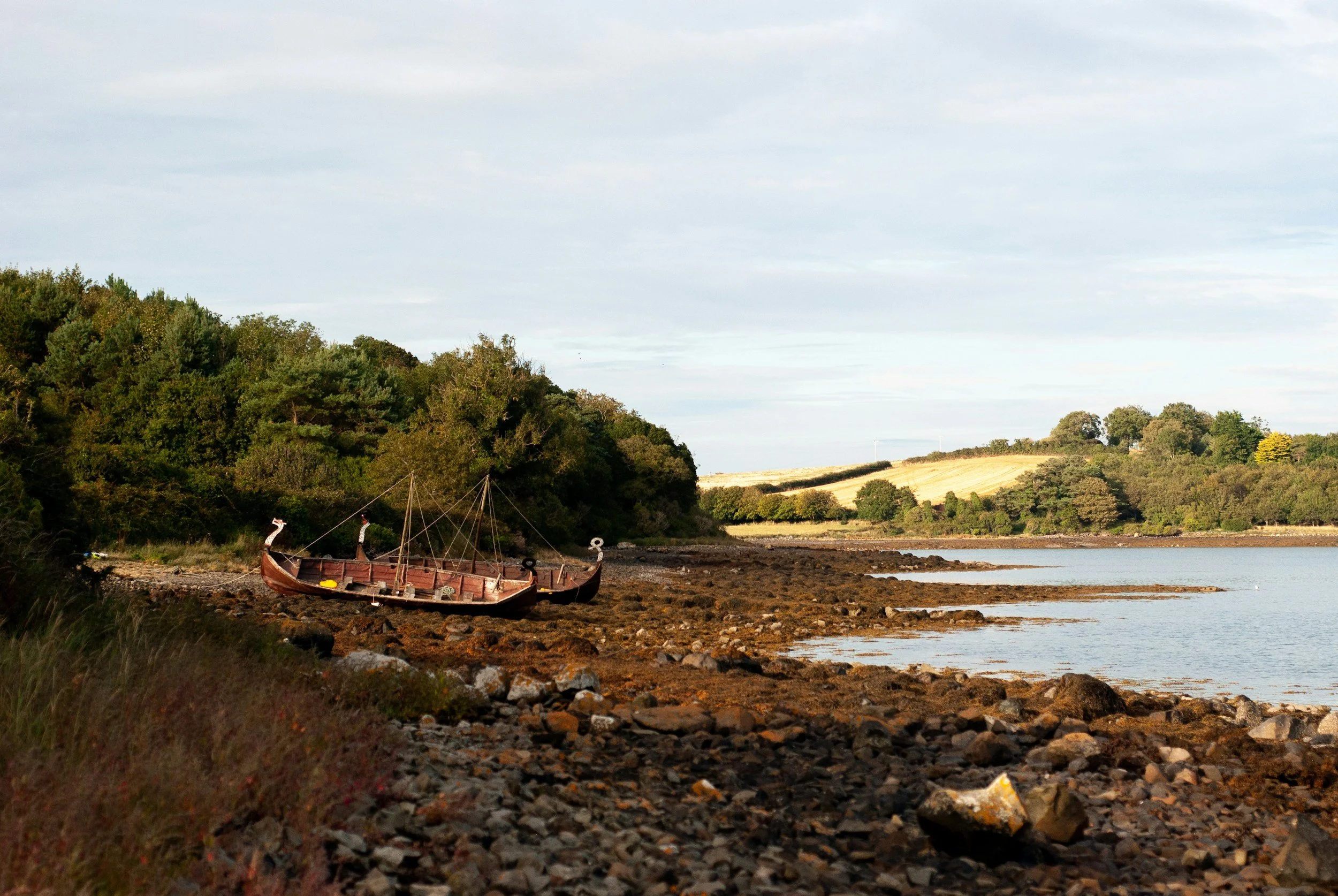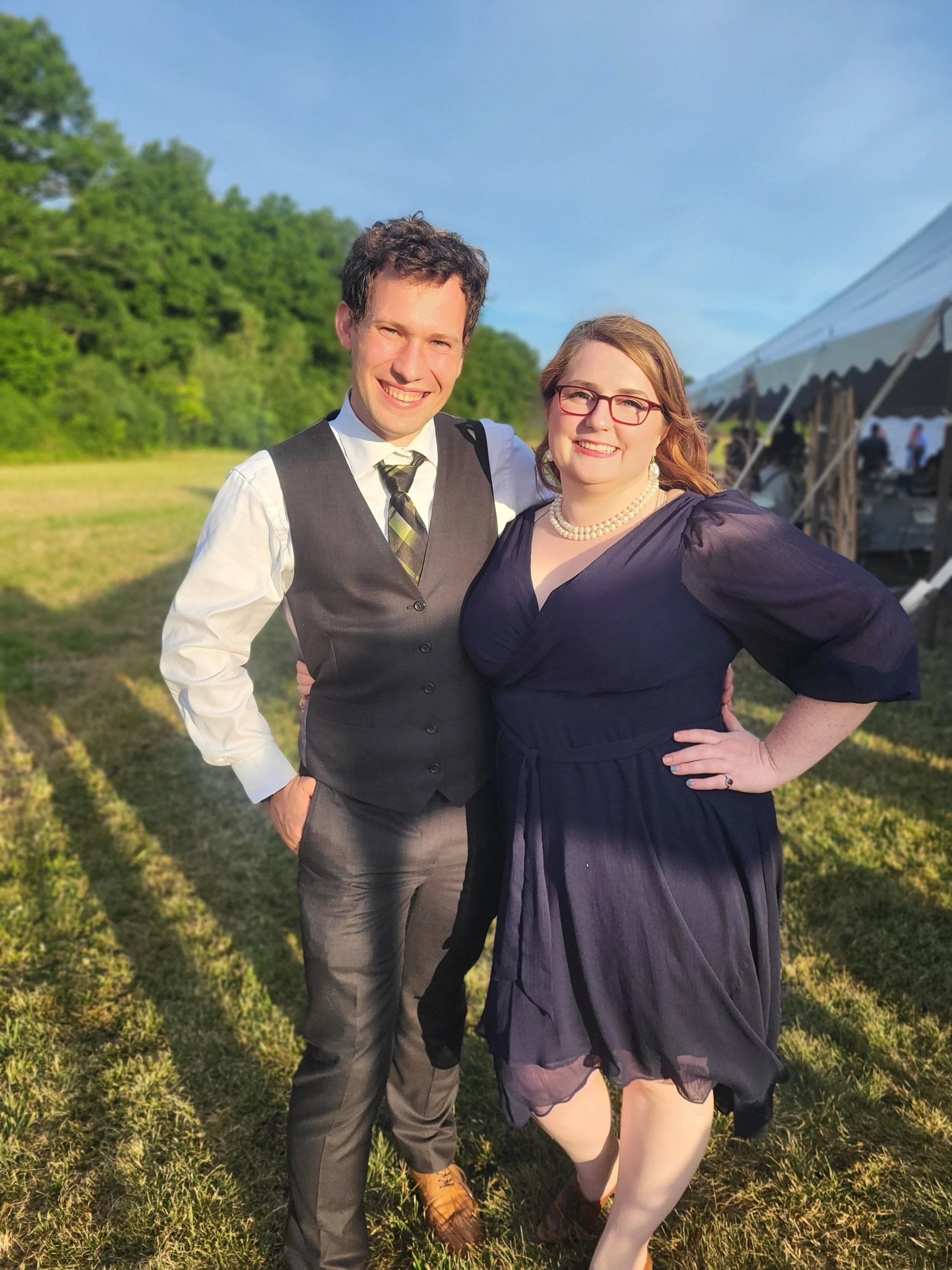
History matters.
How we do history matters more.
But first, let me introduce myself.
Hi! I’m Kevin Hoffman.
I like Medieval things.
If you’re a medievalist reading this, you may not be surprised to hear that my early interest in medieval history was sparked by playing games, mainly Age of Empires II.
Yes, you read that right. That’s Age of Empires II, the classic computer game.
And if you’re like the majority of historians, you probably have a similar story: at some point in your life (in my case, childhood), you encountered something that captured your imagination so much that you devoted the rest of your life to learning more about it.
And if you’re not a historian, then you just got a brief glimpse into the psychopathy that drives academics to live out their days surrounded by books and stale cups of tea (or coffee or whiskey or whatever floats your longship) and—if they’re as lucky as I am—a cat or two purring nearby.
This is me with my wife, Naomi. She’s not medieval, but I still like her a lot anyways.

My Academic Journey
I entered undergrad knowing I wanted to be a historian, but I was torn. In high school I had fallen in love with economics, but I wanted to study theology.
With a little prompting from practical minded parents, I double majored in economics and history. Now I am an economic historian. Neither fish nor fowl, too historical for most economists and too economic for most historians, but I am content.
Working at the intersection of history and economics has given me an expanded toolbelt of models, methods, and framework in my academic work.
-
Doctoral candidate in History (estimated defense Spring ‘25)
Supervisors: Noel Lenski and Paul FreedmanComprehensive exams with honors
M.A. and M.Phil. in History, 2021
Additional Certificates:
ARCHAIA certificate
Public Humanities certificate
Certificate of College Teaching Preparation -
Postbaccalaureate Certificate in Classics
-
M.A. in Anglo Saxon, Norse, and Celtic Studies (ASNC)
Supervisor: Simon Keynes -
B.A. in History
B.A. in Economics
Now, back to business.
History is principally the study of people. Anything and everything that bears on the individual is a viable “historical auxiliary science.” But history isn’t a science, even though it is dependent upon them.
History is an art. One that relies on the historian to bring everything to bear to better understand our forebears. It is therefore a moral art that requires the full empathy of the historian to balance the need to tell the truth (as we see it) and understand our subjects.
History matters.
How we do history matters more.
Let me explain!
…no, there is too much. Let me sum up.

Reimagining the early medieval North Sea region
The early medieval North Sea is a prime example that the ‘how’ of history matters.
Both academically and as a culture, we’ve had a tendency to make many assumptions about the region and time period without letting the data speak for itself.
When we actually stop to examine daily life—what they ate, crafted, and traded, the change they carried in their pockets, and how they navigated a post-Roman world—we learn that their experiences probably looked pretty different than what is in our collective mind.
In fact, their political and economic structures were almost certainly more advanced than we typically give them credit for. In short, maybe they’re a lot more like us than we’d like to admit.
-
The natural world is an active player in history. This is particularly true for the early medieval world. Volcanically forced climatic disasters, plagues, and changing sea levels (oh my!) strained society considerably, but through it all we see the peoples of the time adapting through various resilience strategies. The importance of the natural world requires historians to adapt to the scientific landscape. The sciences can be “historical auxiliary sciences” too!
-
What if we considered a world, not divided by water, but united by it? If we can focus on the Mediterranean as a sea, why not the combined Irish, North and Baltic Seas? What if we thought of a Northern Sea region? In a world stretching between Ireland and Estonia, there is a lot of water. The sea served as the fastest way of travel in the period, enabling trading, migrations, and yes, raiding. Even the poetry and mythology of the period stresses the importance of the sea. Fortunately for us, a number of vessels (or parts) have survived to the present day.
-
Coins are a unique piece of evidence. They often tell us who made them and where, and they are found in discrete location. Through them, we can trace the movements of goods and peoples. These objects also provide an entry point into discussions of the economy. Although badly degraded after the fall of Roman empire, an economy limped on. The use of gold coins of high value eventually gave way to a silver boom in the 7th century.
-
The early medieval world was one of considerable movement. Whether forced from their homes due to intensifying winters, fleeing war, or just stopping by to trade, there were plenty of vessels crossing the sea. We have evidence for trade, migration, and aristocratic gift giving. This is a dynamic period, which makes it exciting to study.
So…what now?
Inspiring better historical imagination inside the classroom…
At the end of the day, why is history even important? Is it just to gather more facts and build more academic theories? Just to train more historians? Or is there a deeper purpose to our quest for greater understanding of the past?
I believe the primary role of a historian in their capacity as a teacher, is to help their students learn how to do history. By doing so, students become more engaged with the course material and grow in their wholistic personal development.
…breaking down barriers between classrooms…
History doesn’t occur in a vacuum, so the study of it shouldn’t either. By actively engaging with other disciplines and fields of study, we can cultivate a much richer and deeper picture of history, which enhances our understanding of the historical person significantly. In my work and teaching, I aim to thoughtfully integrate data and models derived from various other disciplines, and I strive to teach students how to critically analyze and synthesize a diverse array of data sources.
This interdisciplinary approach not only makes the study of history more exciting, but also equips students with essential skills for their academic and professional journeys.
…and sparking curiosity outside the classroom.
The beautiful thing is that historical imagination is available to everyone, not only to students, historians, and other academics. The worlds of curation and data visualization can help history come alive in ways that can help inspire a love of the subject. It is exciting to inspire the next generation to find value and joy in historical reasoning.
Additionally, as a dedicated fantasy, board game, and RPG enthusiast, I feel incredibly fortunate to apply my historical and economic insights to a variety of fascinating projects that extend far beyond the walls of traditional academia. What good is it to have all the knowledge in the world if no one can access it?

